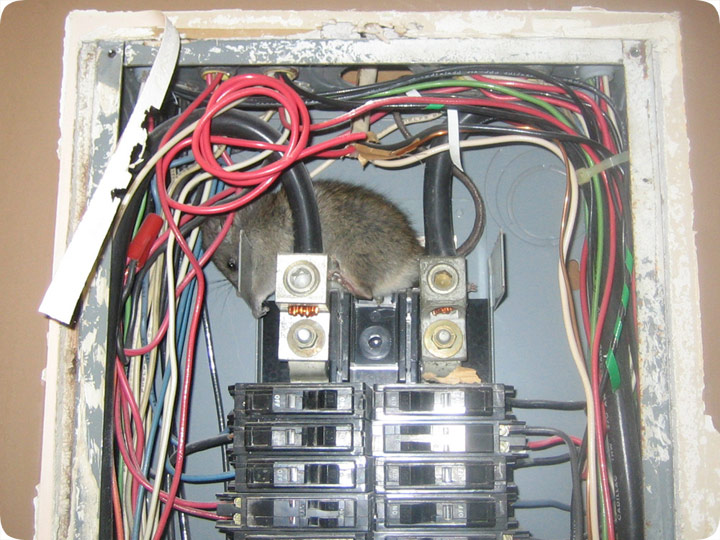-
info@aaanimalcontrol.com
Call us for help in your town
Humane Wildlife Education
How To Find a Rat

12.02.2005 - It is my job to find rats. I am a rat control expert, specializing in the extermination and eradication of rats. I have to find both living and dead rats, and in the case of living rats, make them dead. In this case, a circuit breaker box did the job for me. This job
took place at a dental office. The dentist was finding rat droppings throughout the office, on the chairs, in the cabinets, and even on the dental picks and drill bits. These tools ended up in patient's mouths. Mmm!!! I was hired to solve the rat problem.
The first key to finding rats is to find out how they are getting into the building. They are expert climbers, and they can fit through extremely small openings. Thus, it's important to examine the whole building and identify every last possible entry hole leading inside the structure.
At this dental office, I found missing screens in roof vents, open plumbing stacks, and worst of all, several sections of chewed-open soffit. Once I'd found all the openings, I was able to set traps at the points inside the attic where the rats were coming in. I caught and removed the rats,
and sealed the openings shut.
However, during the process, there was a bad odor in the building, and it wasn't from the grinding of drill on decaying tooth. No, it was much worse. I smelled a rat, and it was tattling to the patients that this dentist had a rat problem. He did not like that one bit, and wanted
the rat taken care of, by any means. I knew that all of my traps had been accounted for, I keep meticulous track. There were no misfires, but I smelled a rat, a dead rat.
I sniffed through the whole office, and I suspected the odor most strongly in one area, and I crawled through the drop ceiling (this is an extremely difficult task, by the way, unless you are very light and agile), and sniffed and sniffed. This little bastard was really hard to find! I'm an
expert at finding dead rats, but I couldn't find this one anywhere in the drop ceiling. I sniffed and sniffed - the whole place smells bad, and the air is flowing strong from all around, so it is not easy to pin down. Finally, I found what I thought was the jackpot area, and by looking
down a little crack from the ceiling, I could see bits of rat fur and tail. I could not reach from the ceiling, so I went back down into the office, and I found that the area was the circuit breaker box! This rat had gone down there and electrocuted itself! I pried
it out of there, sprayed a special cleaner, and the smell went away. I found the rat, and now the patients of this office can enjoy a wonderful rat-feces-free dental experience. If you need me to find the rat in your building, just give me a call.
Do it yourself: Visit my How To Get Rid of Rats page for tips and advice.
Get professional help: Visit my Nationwide Pro Directory of wildlife removal experts.

For more wildlife stories, click my Wildlife Blog
or click my below banner to hire a local trapper.
You may have experienced hearing odd scratching and rustling noises around your home. This often indicates that there's a rat within your property, which can be a problem.
One of the reasons rats are so hard to deal with is because they are hard to detect in the first place. Next to this, the trapping process isn't always the easiest to deal with either.
But first thing's first, there would be no point in setting up traps and bait to capture a rat if you can't find where it is.
Here's how to find a rat and what to do with it after:
Locate where the sounds of scampering come from.
Finding where a rat stays in your home can take a while, especially since they try to stay as hidden as possible and move around quite often.
The first step to locating where they might be hiding is by following where the sound comes from. This will give you an idea of where they may be going to and fro.
Check the area to see if there are rat droppings.
Once you have this figured out, check the place for any droppings. This could indicate that they are there or have been staying there.
Most of the time, there will be droppings in the spaces where rats would stay.
Look for the entry points nearby or potential food sources.
Examine the area for any good reason for a rat to stay such as because of an entry point close by or because there are easily accessible food sources from that space.
One of the top reasons rats use to consider where they should stay is how far or close they are to the resources they need to survive, particularly because they usually go scavenging.
Signs of gnawing.




















